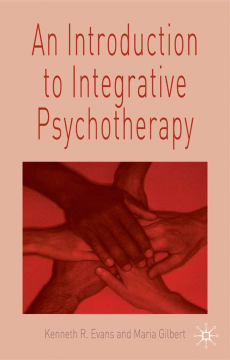
Additional Information
Book Details
Abstract
This text provides an invaluable and accessible overview of the rapidly developing field of integrative psychotherapy, and introduces a relational-developmental approach to theory and practice. The book critiques the philosophical bases underpinning the theoretical model, looks at the nature of resistance in different phases of therapy, and presents an engaging clinical case study. The book goes beyond the confines of the therapy room and explores the significance of the cultural, ecological and transpersonal dimensions of therapy.
KEN EVANS is Director of the Sherwood Psychotherapy Training Institute and has been committed to the development of an independent profession of psychotherapy for over twenty five years. Founding President of the European Association for Integrative Psychotherapy and Training Standards Officer for the United Kingdom Council for Psychotherapy (1998-2001).
MARIA GILBERT is a Chartered Clinical Psychologist, integrative psychotherapist, trainer and supervisor with many years' experience of adult education and organizational consultancy. She is Head of the MSc Integrative Psychotherapy and Supervision Diploma programmes at the Metanoia Institute. In addition, she is Past President of both the United Kingdom Association for Psychotherapy Integration and the European Association for Integrative Psychotherapy. She is a visiting teacher to a number of UK and European training institutes.
Together they have authored Psychotherapy Supervision (Open University Press).
'[A] concise, informative and readable introduction to Integrative Psychotherapy.' - Therapy Today
Table of Contents
| Section Title | Page | Action | Price |
|---|---|---|---|
| Cover | Cover | ||
| Contents | vii | ||
| Preface to an integrative relational model of psychotherapy | 1 | ||
| Part 1 Philosophy, history and research | 5 | ||
| 1 Philosophy and values of integrative psychotherapy | 7 | ||
| 2 The history of integration in psychotherapy | 21 | ||
| 3 A basis in psychotherapy outcome studies supports an integrative model | 35 | ||
| Part 2 Theoretical underpinnings | 45 | ||
| 4 A developmental–relational model for integration | 47 | ||
| 5 The process of integrative psychotherapy and a critique of the model | 65 | ||
| Part 3 Clinical case study – the practical application of theory | 81 | ||
| 6 Assessment and diagnosis – 'It–It' relationship | 83 | ||
| 7 Intrapsychic focus – 'I–It' relationship | 101 | ||
| 8 Interpersonal focus – 'I–Thou' relationship | 115 | ||
| 9 'I–Thou' mutuality – the end of the relationship | 127 | ||
| 10 The parallel process in supervision | 133 | ||
| Part 4 Challenges and concerns | 143 | ||
| 11 Training integrative psychotherapists | 145 | ||
| 12 Professional practice issues | 157 | ||
| Appendix | 167 | ||
| Bibliography | 174 | ||
| Index | 183 |
